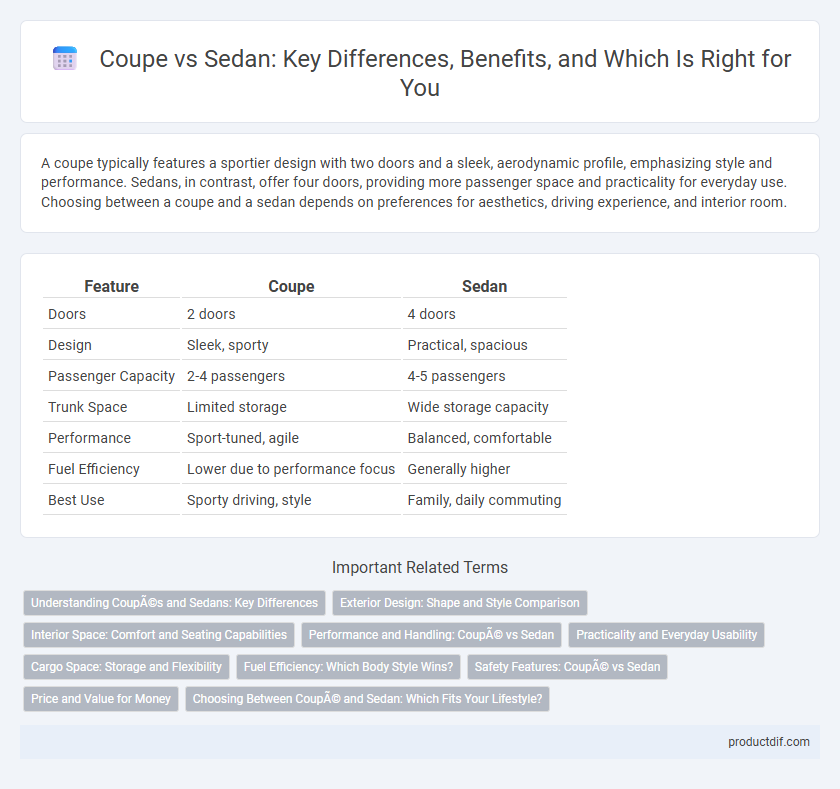A coupe typically features a sportier design with two doors and a sleek, aerodynamic profile, emphasizing style and performance. Sedans, in contrast, offer four doors, providing more passenger space and practicality for everyday use. Choosing between a coupe and a sedan depends on preferences for aesthetics, driving experience, and interior room.
Table of Comparison
| Feature | Coupe | Sedan |
|---|---|---|
| Doors | 2 doors | 4 doors |
| Design | Sleek, sporty | Practical, spacious |
| Passenger Capacity | 2-4 passengers | 4-5 passengers |
| Trunk Space | Limited storage | Wide storage capacity |
| Performance | Sport-tuned, agile | Balanced, comfortable |
| Fuel Efficiency | Lower due to performance focus | Generally higher |
| Best Use | Sporty driving, style | Family, daily commuting |
Understanding Coupés and Sedans: Key Differences
Coupes feature a sporty design with two doors and a lower roofline, offering a compact, dynamic driving experience ideal for performance enthusiasts. Sedans provide four doors and a more spacious interior, prioritizing comfort and passenger capacity, making them suitable for families and daily commuting. The key differences lie in body style, passenger space, and intended use, with coupes emphasizing style and agility, while sedans focus on practicality and comfort.
Exterior Design: Shape and Style Comparison
The coupe features a sleek, aerodynamic silhouette with a sloping roofline that emphasizes sportiness and agility, often characterized by two doors and a compact rear section. In contrast, sedans boast a more traditional, boxier exterior with four doors and a spacious cabin, prioritizing practicality and passenger comfort. The stylistic differences between coupes and sedans cater to distinct preferences, combining form and functionality tailored to driving experience and lifestyle.
Interior Space: Comfort and Seating Capabilities
Coupes typically offer a more compact interior with limited rear-seat legroom, prioritizing sporty design over passenger comfort. Sedans provide spacious cabins that accommodate five passengers comfortably, featuring ample legroom and headroom for both front and rear occupants. The enhanced interior space in sedans contributes to a more comfortable ride, especially for families and long-distance travel.
Performance and Handling: Coupé vs Sedan
Coupes generally offer superior performance and handling due to their lighter weight and lower center of gravity, providing enhanced agility and faster acceleration. Sedans typically prioritize comfort and stability, featuring a longer wheelbase that delivers smoother rides but slightly less responsive handling. The sportier suspension tuning in coupes allows for sharper cornering, making them ideal for drivers seeking dynamic driving experiences.
Practicality and Everyday Usability
Coupes typically feature two doors and a sportier design, which can limit rear-seat access and cargo space, affecting their practicality for daily use. Sedans offer four doors and more spacious interiors, providing easier entry for passengers and greater trunk capacity, enhancing comfort and convenience for everyday commuting or family needs. The sedan's configuration generally supports better all-around usability, especially for those requiring frequent passenger access and additional storage.
Cargo Space: Storage and Flexibility
Coupes typically offer limited cargo space due to their compact design and sloping roofline, making storage options more restrictive compared to sedans. Sedans provide greater storage capacity with a larger trunk and often feature split-fold rear seats for enhanced flexibility in accommodating bulky items. For drivers prioritizing cargo space and versatility, sedans present a more practical choice over coupes.
Fuel Efficiency: Which Body Style Wins?
Coupes generally offer better fuel efficiency due to their lighter weight and aerodynamic design compared to sedans. The reduced drag and compact size of coupes contribute to lower fuel consumption, especially in city driving. Sedans, while often heavier, may balance comfort and efficiency but typically consume more fuel over similar distances.
Safety Features: Coupé vs Sedan
Coupes often have a sportier design with a stiffer chassis that can enhance handling and collision protection, but sedans typically offer more advanced safety features like multiple airbags, electronic stability control, and superior crash test ratings due to their larger size. Sedans generally provide better rear passenger safety with more headroom and easier access in emergencies, whereas coupes may have limited space impacting escape routes. Both vehicle types incorporate modern driver-assist technologies, but sedans usually come equipped with a wider range of standard safety systems aimed at family and commuter protection.
Price and Value for Money
Coupes generally have a higher starting price compared to sedans due to their sportier design and performance features, which can increase maintenance costs over time. Sedans offer better value for money with more spacious interiors, improved fuel efficiency, and lower insurance rates, making them practical for daily commuting and family use. When balancing price against long-term usability and comfort, sedans typically provide a more cost-effective choice.
Choosing Between Coupé and Sedan: Which Fits Your Lifestyle?
Coupes offer a sporty design and agile handling, ideal for drivers seeking style and performance in urban environments, while sedans provide spacious interiors and comfort suited for families and long-distance travel. Prioritize factors like passenger capacity, trunk space, and typical driving conditions when deciding between a coupe and a sedan. Your lifestyle demands, including daily commuting needs and cargo requirements, will determine which vehicle type aligns best with your preferences.
Coupé vs Sedan Infographic

 productdif.com
productdif.com